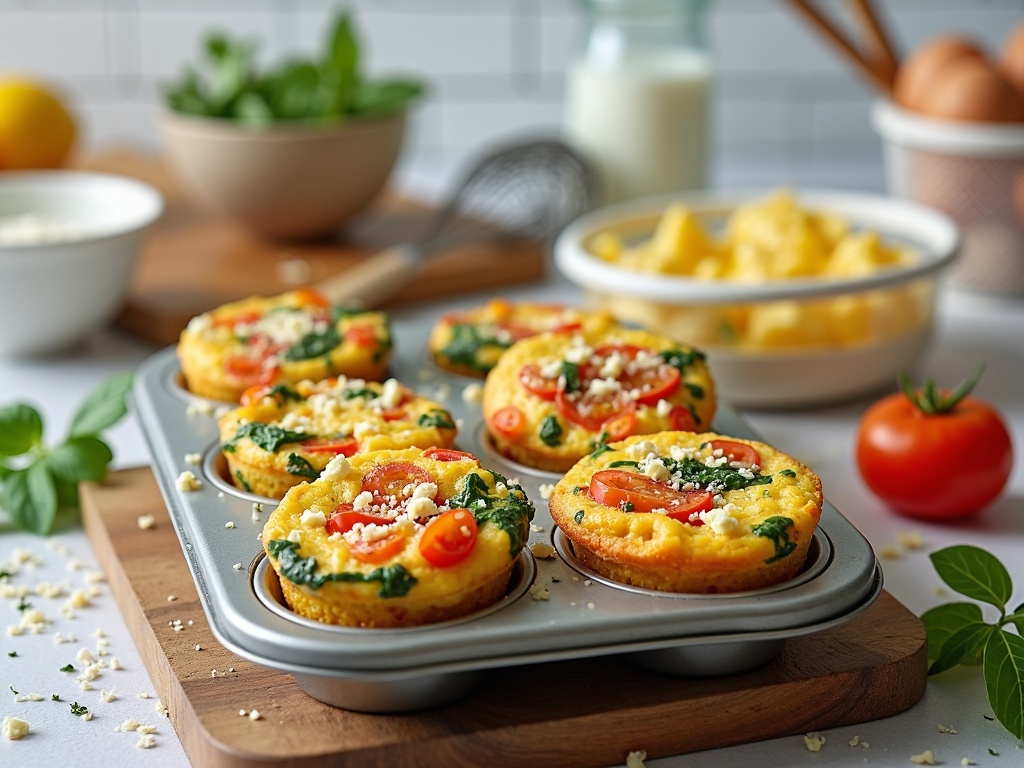Egg muffin cups are the perfect answer for busy mornings, combining convenience, flavor, and excellent nutritional benefits in a grab-and-go format. Each cup packs 8g of protein and just 5g of fat per 125-calorie serving, making them an ideal meal prep option that can be customized to countless flavor profiles.
Find In This Article
Key Takeaways
- Egg muffin cups store beautifully for up to 5 days in the refrigerator and can be frozen for up to 3 months, making them ideal for meal prep.
- With only 125 calories and 8g of protein per serving, they provide sustained energy without mid-morning crashes.
- The base recipe is simple (eggs, milk, salt, pepper) but can be customized with various vegetables, proteins, cheeses, and seasonings.
- Proper preparation includes greasing the muffin tin thoroughly and filling cups only ¾ full to prevent overflow.
- They’re adaptable to global flavor profiles, from Italian and Mexican to Asian-inspired variations.
Why Egg Muffin Cups Are Your New Breakfast Hero
I’ve discovered the perfect solution for hectic mornings when time feels impossibly short but nutrition remains non-negotiable. Egg muffin cups have completely transformed my morning routine, offering that rare combination of convenience, taste, and serious nutritional benefits.
Nutritional Powerhouses in Portable Form
Each egg muffin cup packs an impressive nutritional punch within its compact size. At just 125 calories per cup, they deliver 8g of protein and only 5g of fat, making them a nutrient-dense option that keeps hunger at bay throughout the morning. They’re rich in essential nutrients that many breakfast options lack – including vitamin B12 for energy production, vitamin D for immune function, and choline for brain health.
What makes these little wonders particularly special is their versatility. I can customize them with endless variations of vegetables, herbs, and proteins while maintaining their core nutritional benefits. For anyone following specific dietary plans, egg muffin cups fit perfectly into keto and low-carb lifestyles thanks to their minimal carbohydrate content and emphasis on protein and healthy fats.
The Meal Prep Game-Changer
My Sunday meal prep routine now always includes a batch of these portable breakfast gems. Here’s why they’ve become my go-to breakfast prep strategy:
- They store beautifully in the refrigerator for up to 5 days, maintaining both flavor and texture
- A quick 30-second microwave reheat restores them to their fresh-baked glory
- The protein-forward formula provides sustained energy without mid-morning crashes
- Their portable nature means I can grab them on the way out the door on particularly rushed mornings
The high-protein breakfast approach has additional benefits beyond just convenience. Research shows protein-rich morning meals help regulate appetite throughout the day, supporting weight management goals by increasing satiety and reducing cravings. With 8g of protein per muffin cup, eating two provides nearly a third of many people’s daily protein requirements.
I’ve found these egg cups particularly helpful when I’m watching my weight. Their satisfying protein content keeps me full far longer than carb-heavy alternatives like bagels or cereal, eliminating those energy crashes that often lead to unplanned snacking before lunch.
For busy families, egg muffin cups solve the perpetual morning rush dilemma. Kids love their handheld format, and parents appreciate knowing they’re getting proper nutrition before school. They’re infinitely customizable to accommodate picky eaters – adding cheese, turkey bacon, or various vegetables can transform them to suit almost any preference.
Unlike their fast-food McMuffin counterparts, homemade egg muffin cups give me complete control over ingredients, allowing me to avoid unnecessary additives while maximizing nutrition. They’re simple enough for cooking beginners yet versatile enough to satisfy more experienced cooks looking to experiment with flavors and ingredients.
For anyone struggling with breakfast monotony or morning time constraints, egg muffin cups offer that rare perfect solution – nutritionally superior, infinitely adaptable, and genuinely convenient without compromises. Their combination of portability, nutritional density, and meal prep potential makes them truly unmatched in the breakfast landscape.

Everything You Need to Make Them
I’ve discovered that egg muffin cups are one of the most versatile breakfast options you can make. They’re essentially mini frittatas baked in a muffin tin, perfect for meal prep and busy mornings. Getting started with these protein-packed treats is simple once you have the right ingredients on hand.
Essential Ingredients for Perfect Egg Muffin Cups
The base recipe requires just a few simple ingredients. I start with 6 large eggs and ¼ cup of milk whisked together with a pinch of salt and pepper. This creates enough mixture to fill about 6-8 standard muffin cups, depending on how many add-ins you include.
For vegetables, I’ve found these options work wonderfully:
- Spinach (chop it finely for even distribution)
- Bell peppers (any color, diced small)
- Onions (red or white, finely diced)
- Mushrooms (sliced thin and pre-sautéed to remove moisture)
- Tomatoes (diced and seeds removed to prevent sogginess)
When it comes to proteins, these additions can transform your egg muffins into a complete meal:
- Cooked and crumbled turkey bacon
- Ground sausage (pre-cooked and drained)
- Diced turkey breast
- Shredded chicken (leftover rotisserie chicken works great)
Cheese isn’t just delicious—it adds creaminess and helps bind everything together. My favorite options include:
- Shredded cheddar for classic flavor
- Crumbled feta for tanginess
- Mozzarella for that satisfying cheese pull
- Pepper jack for a spicy kick
Don’t forget seasonings! They’re the secret to elevating your breakfast sandwich alternative. I regularly use:
- Garlic powder
- Paprika (regular or smoked)
- Dried basil
- Oregano
The beauty of egg muffin cups is how easily they can be customized into different flavor profiles. For a Mediterranean-inspired version, I combine spinach, feta cheese, diced tomatoes, and a sprinkle of oregano. The salty feta balances perfectly with the earthy spinach.
If you’re craving something with a bit more kick, try a Southwestern style cup. I mix in diced jalapeños (seeds removed if you want less heat), bell peppers, onions, and sharp cheddar cheese. A dash of cumin and chili powder completes the flavor profile.
These McMuffin alternatives can be prepared ahead of time, refrigerated for up to 4 days, or frozen for up to 3 months. I’ve found they reheat beautifully in the microwave for 30 seconds (from refrigerated) or 1-2 minutes (from frozen).
Having these ingredients on hand means you’re always ready to whip up a batch of egg muffin cups. They’re perfect not just for quick breakfast meals but also as protein-packed snacks throughout the day.
What I love most about these versatile breakfast foods is how they can be adapted to whatever ingredients you have on hand. No bell peppers? Use zucchini instead. Out of cheddar? Try gouda or even a dairy-free alternative. The egg base provides a neutral canvas for endless flavor combinations.
With just a muffin tin, mixing bowl, and these simple ingredients, you’re all set to create a week’s worth of delicious, protein-packed breakfasts in under 30 minutes.
Master the Perfect Egg Muffin Cup
I’ve perfected the art of making egg muffin cups after countless kitchen experiments. These portable protein powerhouses have become my go-to for busy mornings when I need a nutritious breakfast on the run. The best part? They’re incredibly versatile and can be customized to suit any taste preference.
Preparation Essentials
The secret to perfect egg muffins starts with proper preparation. First, I preheat my oven to 350°F (175°C) to ensure even cooking. This moderate temperature allows the eggs to cook through without burning the edges. Next, I thoroughly grease the muffin tin with cooking spray or butter. Don’t skip this step! Even with non-stick pans, eggs have a tendency to cling, and proper greasing saves frustration later.
In a large bowl, I whisk together eggs and a splash of milk until the mixture is smooth and well combined. For a standard batch that makes 12 muffin cups, I typically use 10-12 large eggs and about 1/4 cup of milk. The milk adds a lovely fluffiness to the final texture.
Creating Flavor Combinations
The mix-ins are where breakfast sandwich alternatives get exciting! I add my choice of:
- Chopped vegetables (bell peppers, spinach, onions, mushrooms)
- Cooked proteins (turkey bacon, chicken, or beef sausage)
- Seasonings (salt, pepper, garlic powder, herbs)
- Cheese (cheddar, feta, or mozzarella)
After combining all ingredients, I fill each muffin cup about 3/4 full. This is important because the egg mixture will rise during baking, and filling them too full leads to overflow and a messy oven.
I bake them for 20-25 minutes until the centers are set and a toothpick inserted comes out clean. The edges should be lightly golden, and the cups should have a slight puff to them. These breakfast meals store beautifully in the refrigerator for up to five days, making them perfect for meal prep.
For a complete McMuffin-inspired experience at home, I sometimes serve these between English muffin halves with a slice of cheese. They’re much healthier than fast food alternatives and can be customized to include your favorite breakfast foods and flavors.
Common Mistakes and How to Avoid Them
Making perfect egg muffins isn’t rocket science, but certain pitfalls can turn this simple breakfast delight into a kitchen disaster. I’ve learned these lessons through plenty of trial and error, and I’m sharing them to help you avoid the same frustrations.
Kitchen Blunders That Ruin Your Egg Muffins
Skipping the preheat step is a cardinal sin when making egg muffin cups. I always ensure my oven reaches the right temperature before sliding in the muffin tin. Cold ovens cause uneven cooking and can make your muffins dense instead of fluffy. For consistent results, give your oven at least 10-15 minutes to reach the desired temperature.
Overfilling the muffin cups is another common error. I’ve made this mistake countless times, ending up with egg mixture bubbling over and creating a messy oven. Fill each cup only about 3/4 full to allow space for the mixture to rise during baking. This simple rule transforms your breakfast sandwich add-on from messy to perfect.
Many home cooks tend to under-season their egg muffins. Don’t be shy with salt, pepper, and herbs! The eggs will absorb these flavors during cooking. I season generously, tasting the raw mixture (safely) before pouring it into the cups. This approach guarantees delicious McMuffin-style results at home.
Here are crucial timing mistakes to avoid:
- Removing egg muffins too quickly from the tin (wait at least 5 minutes)
- Skipping the toothpick test for doneness (insert it in the center – it should come out clean)
- Not adjusting cooking time based on add-ins (meat and veggies add moisture)
- Forgetting to rotate the pan halfway through baking for even cooking
Patience plays a key role in the cooling process. I’ve ruined perfectly good breakfast meals by rushing this step. Allow your egg muffins to cool in the tin for 5-10 minutes before attempting to remove them. They need this time to set properly and release from the sides of the pan.
The toothpick test remains the most reliable way to check doneness. Insert a toothpick into the center of a muffin – if it comes out clean, they’re ready. Undercooked egg muffins aren’t just unpleasant; they can also pose food safety concerns. These breakfast foods should reach an internal temperature of 160°F for safe consumption.

Global Flavors and Variations
I’ve discovered that one of the best things about egg muffins is how easily they adapt to global flavors. These versatile little cups can transport your taste buds around the world while maintaining their convenient, protein-packed format.
Flavor Adventures Around the World
Italian-inspired egg muffin cups bring the Mediterranean right to your breakfast table. I mix grated zucchini, diced cherry tomatoes, and small cubes of fresh mozzarella into the egg mixture. A sprinkle of dried oregano and basil elevates these cups to remind me of pizza in breakfast form.
For a Mexican twist, I add browned turkey chorizo, black beans, and a dash of cumin to create a spicy morning treat. These flavor-packed cups pair wonderfully with a dollop of avocado or salsa on top for a complete breakfast meal that’s sure to satisfy.
Asian-inspired egg muffin cups offer a unique flavor profile that works surprisingly well. I finely chop bok choy and mix it with eggs, then add a few drops of sesame oil and sliced scallions. The result is light yet flavorful, especially with a small drizzle of soy sauce before serving.
For vegetarian options that don’t skimp on protein, I create cups with these ingredients:
- Black beans and corn with a touch of chili powder
- Crumble extra-firm tofu with spinach and nutritional yeast
- Chickpeas and roasted red peppers with Mediterranean herbs
Different ingredients affect cooking times slightly. I’ve found that vegetable-heavy muffins might need an extra minute or two, while meat-filled options cook perfectly in the standard time. When using denser ingredients like beans or chorizo, I make sure they’re evenly distributed so the breakfast sandwich alternative cooks uniformly.
These variations have transformed my morning routine, offering the familiarity of a McMuffin experience with globally-inspired flavors. I often prep different variations in a single batch, creating a colorful array of breakfast foods that keep mornings interesting all week long.
Storage and Meal Prep Success
I’ve found that egg muffin cups are perfect for meal prepping because they store so well. After cooking a batch, let them cool completely before storing them in an airtight container in the refrigerator. They’ll stay fresh for up to 5 days, making them perfect for quick weekday breakfasts.
For longer storage, these little protein powerhouses freeze beautifully. Just place the cooled muffins in a freezer-safe container or zip-top bag and they’ll keep for up to 3 months. I like to separate layers with parchment paper to prevent sticking.
Reheating for Perfect Results
Reheating couldn’t be simpler. From refrigerated, 30 seconds in the microwave usually does the trick. If they’re frozen, 60 seconds on high will have them ready to enjoy. The texture stays surprisingly good, unlike some reheated egg dishes that can get rubbery.
For those who prefer a crispier exterior, you can also pop them in a toaster oven for a few minutes. This works especially well if you want to pair them with a breakfast sandwich for a more substantial meal.
Strategic Meal Prep Tips
I’ve made Sunday my official egg muffin prep day, and it’s transformed my morning routine. A single batch of 12 muffins provides quick breakfast meals all week long. Here’s why this approach works so well:
- Creates grab-and-go options for busy mornings
- Eliminates daily cooking cleanup
- Ensures balanced protein intake throughout the week
- Prevents the temptation of less healthy convenience foods
- Saves money compared to store-bought alternatives like a McMuffin
One of the best things about egg muffin cups is how they reduce food waste. That handful of spinach about to wilt, the last bits of chicken breast, or those few mushrooms left from dinner can all find purpose in next week’s egg cups. They’re the perfect blank canvas for using up small amounts of ingredients that might otherwise be thrown away.
The flexibility of this breakfast food means you can adapt to whatever you have on hand. I change the flavor profile each week based on what needs using up – sometimes going Mediterranean with feta and olives, other times Southwestern with peppers and a sprinkle of cumin. This adaptability keeps breakfast interesting while being practical and budget-friendly.

Sources:
Journal of Nutrition, 2020
EatingWell, 2021
Healthline, 2022

